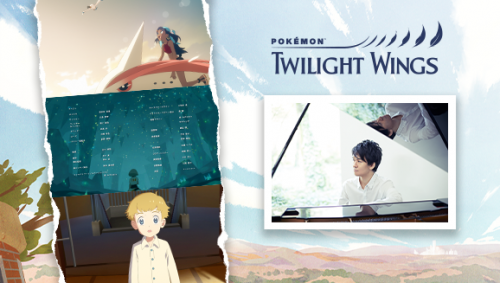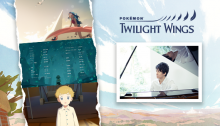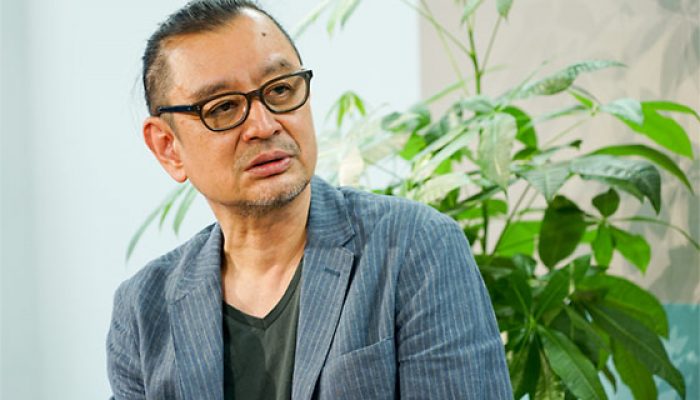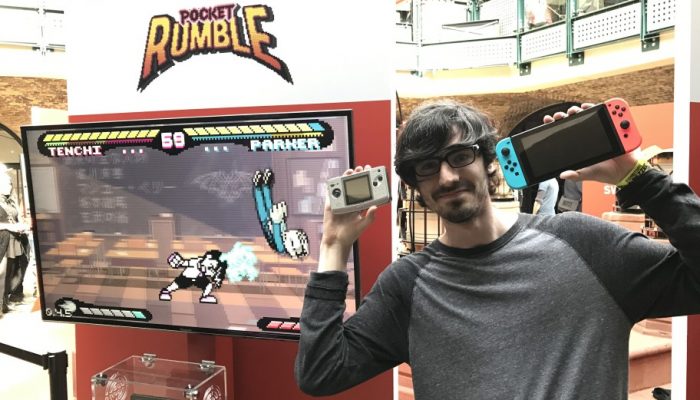 “I’ve watched each episode through hundreds of times in the process of making the music, too, so it’s extremely hard to choose a specific moment, but if I had to pick, I’d say the first episode left a very strong impression since it served as my entryway into Twilight Wings.”
“I’ve watched each episode through hundreds of times in the process of making the music, too, so it’s extremely hard to choose a specific moment, but if I had to pick, I’d say the first episode left a very strong impression since it served as my entryway into Twilight Wings.”
☆ NintendObs Weekly – Monday, November 16, 2020 – Sunday, November 22, 2020.

Meet Conisch, the Composer behind Pokémon: Twilight Wings
Learn about what goes into creating a melodic soundtrack in the third in our series of interviews with the creators of this animated series.
November 19, 2020
In our third round of interviews with the creators of Pokémon: Twilight Wings, Conisch gives us a fascinating look into the process of composing the music for the series and the ideas that went into the score.
Q: I understand you wrote the music for Twilight Wings. Can you explain exactly what that entails in the context of the production process?
A: I compose the type of music that’s commonly known as a soundtrack—the musical accompaniment to a play or theatrical work, sometimes called background music. For animated works, I receive the creators’ artwork and footage with the cast’s voices included and add music to it as I watch. There’s a lot of variety among scenes that require music—sometimes it has to get at what someone’s feeling, for example, and other times it might have to evoke the image of a specific place. But for each scene, the music I compose is designed to bring out the overall effect or concept of the work.
Q: Does that ever create situations where you’ve composed something in advance based on your concept of what the work is like, but when you pair it with the art, you find it doesn’t quite match?
A: Frequently, yes. Sometimes the mismatch arises from the animation or artwork, but hearing the actors’ voice work sometimes changes my concept of the work, too. Hearing the voice actors’ actual performance has often inspired me to change something I’d already written.
Q: I understand that different types of music can completely change the impression of a scene or change the feel of a work—any work, not just Twilight Wings. What do you place the most value on when you’re composing?
A: The short answer is that I want to create music that uniquely embodies the work. Since animated works aren’t filmed but rather created, in many ways, when you make an animated movie, you’re building something real out of a dream. But in order to make that happen, I think it’s crucial to consider how everyone—meaning the creators and the audience—can become immersed in the world being created.
For me, music has always been the gateway into that dream world. Ever since I was little, I’ve loved comics and cartoons—I used to play pretend all the time, imagining that those worlds were real. (Laughs.) I felt like I could enter the world of a certain work just by hearing its music, and that formative experience for my young self was what led me to become a composer.
That’s why creating music that uniquely embodies a work is the theme of my soundtrack composing and the thing I value most.
Q: By the way, if you had to describe how you picture the “core sound” of Twilight Wings, what would it be?
A: That sure is difficult to put into words. Of course, the series’ music itself has its melodies, plus the accompaniments…and then you’ve got sounds meant to create a certain effect, plus percussion—all sorts of sounds. There are these different elements present, and the way you choose to combine them can really change the atmosphere of the music.
The melodies are key, too, but sometimes just one of the sounds in that tapestry you’re making is what creates the whole atmosphere, you know? (Laughs.)
Q: And sometimes you just hear that certain sound or certain melody and instantly realize, “Oh, it’s that song,” right?
A: That’s the ideal outcome. I always hope to create something like that.
Q: Did you know about Pokémon before this project? Did you have a favorite Pokémon, or any memories or stories that stuck with you?
A: I certainly did know about it. In fact, one producer I met after high school gave me a project as a sort of gateway into being a professional composer, and that was to take “Smile” by Toshiko Ezaki—an ending theme for the Pokémon Advanced animated series [in Japan], which was airing at the time—and arrange new versions of it, such as for string quintet, for a CD release. I’ve also been lucky enough to compose some music for commercials for educational Pokémon toys, and I even sang on some of those songs.
I’m really glad those opportunities led to me being able to return to the world of Pokémon in this way. I hope I’ve been able to return the kindness I’ve received.
Q: Have you ever played any of the games or watched the TV series or movies for yourself?
A: I’ve checked out the movies and other works, although partly in a professional capacity! And I had them take me along to some of the orchestra recordings for the movies, too, since they were related to what launched me into being a professional musician. I’d always dreamed of seeing the actual recording process with my own eyes, and doing so really let me get a feel for how the whole project is put together, as well as a glimpse into the atmosphere of the world they were creating.
Q: The songs that play throughout Twilight Wings feel natural to the ear and tend to make the characters and Pokémon more captivating to watch, making things stand out more. What were you thinking about as you wrote them?
A: Thank you very much for the compliment! This relates somewhat to what I said before about what I had in mind as I was composing, but the big idea underlying everything was that Pokémon is a story with a nearly 25-year history, and I approached my work with the goal of making a gift for the people who love the world of Pokémon. I was trying to convey the very atmosphere of Twilight Wings through music.
This might get a little technical, but for example, let’s look at how Nessa grows over the course of Episode 4. I came up with a musical phrase to serve as a motif for Nessa herself. Then I would vary that theme, like changing it a little after she’d gone for a ride on Milotic. The goal was to have Nessa’s progress show through even in the music. And people have contacted me directly to give positive feedback about that choice, even from other countries! That makes me really glad. It feels like I succeeded.
Q: There’s a lot of music in these roughly six-minute episodes, but the series’ ending theme seems like it left a particularly strong impression on the audience. Can you tell us what you envisioned for this song and what you were thinking as you composed it?
A: The director, [Shingo] Yamashita, told me he thought there was something mathematical about classical music and that he liked music with classical underpinnings and thought that might be a good fit. So I kept that in mind. I have a feeling what he said stemmed directly from the inspiration he also drew on for his creative process, so if the music I created left a strong impression on everyone, then maybe I managed to pull off the type of sound the work needed.
The director also specifically told me he wanted the ending song to be the most memorable. Based on that, I felt like I should make the ending theme a sort of message to all the people around the world who love Pokémon. I think there’s a lot that we as humans can learn from Pokémon. I hoped to depict through music the beauty of this wonderful world, where there’s no discrimination or division and everything is embraced.
Q: Were there any particular parts of composing the music for Twilight Wings that you took extra care with, or struggled with, or that left a strong impression?
A: The search for a musical style that uniquely embodies this work. The search ended up spanning all types of musical genres, and sometimes creating crossovers between them. This was something I both took extra care with and struggled with at the time. Ultimately, though, each part of it was so rich, and I remember it as an enjoyable—even thrilling—process.
I’ve watched each episode through hundreds of times in the process of making the music, too, so it’s extremely hard to choose a specific moment, but if I had to pick, I’d say the first episode left a very strong impression since it served as my entryway into Twilight Wings.
I don’t know how much I should say, but personally speaking, the director, Mr. Yamashita, put a little bit of himself into John’s character, so seeing John take his first step toward his dream was extremely moving.
As a result, I think it ended up as an excellent opening, extremely delicate and capturing both a sense of tension and moments of comfort as well.
Q: Out of all the many pieces you wrote, are there any you’re particularly fond of? If so, why?
A: I’m actually still in the process of writing the music for the final episode at the time of this interview, but I have a feeling that the pieces I write for this final episode will end up being my favorites. It’s still just a feeling, though, and I can’t really give a reason. (Laughs.) There’s a lot that’s still taking shape, so it’s hard to say.
Q: But right now, as you’re working on that final episode, you’re feeling like its music might be your favorite of all?
A: Yes, that’s right. With that in mind, if I had to choose a favorite out of what’s been completed, I might choose the piece I mentioned before from the fourth episode: the song that plays after Nessa rides on Milotic’s back. That scene was a relatively long one for this series, but I think I succeeded in composing a piece that captured the feeling of her progress.
Q: Now, can you tell us about any highlights you’re looking forward to—including musical highlights—from what’s to come?
A: That would be whether or not John will actually get to go see one of Leon’s matches! I think the way John chases after his dream is extremely well depicted.
I’ve still got things in the works, too—by the time this interview is published, I’ll hopefully have composed a score that will give John’s dream an extra boost, so I hope you’ll keep an ear out for that.
Q: Lastly, is there anything you’d like to say to fans of Twilight Wings and of Pokémon as a whole?
A: I’ve gotten messages from lots of people as I’ve been composing, which is probably in part thanks to the way the episodes have been released with this monthly cadence.
Those messages have given me great strength during these times that are hard on everyone.
As someone working in the entertainment industry, I’m in a position where I often get to be the one who is providing courage and encouragement to others [through my work], but this time I was on the receiving end of those feelings. It made me very happy.
It means the world to me to have been able to work on a score while consciously aiming to make it a thank-you gift to the listeners who encouraged me. I hope my heartfelt gratitude comes across—thank you!
I’ve also gotten a real sense of how irreplaceable the world of Twilight Wings and Pokémon is for many people, thanks to the interactions I’ve had with fans on Twitter.
I think it goes to show how truly important it is for us to have somewhere we feel like we belong as we go through life.
It made me think that perhaps a shared love for Pokémon could help reduce strife and conflict between people.
Because of that, I hope everyone out there will always continue to keep Pokémon by your side.
It’ll make me lonesome to see the last episode arrive, but if the call ever comes again, I’ll come back anytime. (Laughs.) Let’s meet again somewhere!
About Conisch
Conisch is a composer and pianist born on April 19, 1981. He graduated from Tokyo’s Waseda Jitsugyou High School in the general education curriculum and partially completed a program in composition at the Toho Gakuen School of Music. Afterward, he studied composition under the musicians Masakazu Natsuda, Naoko Hishinuma, and Hiroshi Yamaguchi. He is a trustor and member of the Japanese Society for the Rights of Authors, Composers and Publishers (JASRAC), as well as a member of the Japan Composers & Arrangers Association (JCAA) and the president and representative director of Soranone, Inc. He is affiliated with the musical unit AYACONI.
— Pokémon News
Source: Pokémon.
At NintendObserver, the comments are on Discord.
Click on Community to learn more. 🙂
…
…Wanna play? Buy a Switch.
And if you’ve already got yours, click on Pokémon for everything you need to know about the franchise. 😀






